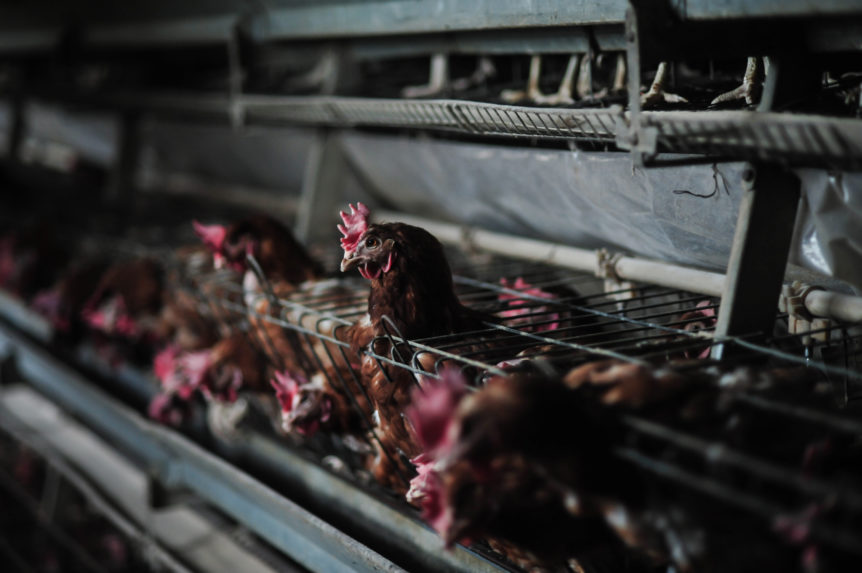- Like
- Digg
- Tumblr
- VKontakte
- Buffer
- Love This
- Odnoklassniki
- Meneame
- Blogger
- Amazon
- Yahoo Mail
- Gmail
- AOL
- Newsvine
- HackerNews
- Evernote
- MySpace
- Mail.ru
- Viadeo
- Line
- Comments
- SMS
- Viber
- Telegram
- Subscribe
- Facebook Messenger
- Kakao
- LiveJournal
- Yammer
- Edgar
- Fintel
- Mix
- Instapaper
- Copy Link
Recently, a poultry farm in Montgomery County, Maryland that sold both meat and eggs was shut down for animal cruelty and filthy conditions. These birds were suffering from various medical conditions and had evidently been denied veterinary care. After officials discovered the state of the farm, over 100 chickens were killed to alleviate horrific suffering and unsafe medical conditions. This wasn’t big news, and that’s the big problem.
Sadly, the treatment of birds that led to this has become the norm in our country. The heartwrenching images from “Happy Farm,” (a poignantly ironic name) sadly represent the conditions for chickens in unregulated industrial agriculture in Maryland and nationwide. While operations like “Happy Farm” are being closed and farmers are being prosecuted, hundreds of millions of birds are suffering in the supply chains of large corporations like Tyson Foods, Perdue Farms, and Mountaire Farms. These injustices are passed on to farmers, workers, and consumers.
Though the poultry and egg companies often advertise happy chickens in rolling green fields, the reality could not be further from that imagery. Enormous poultry operations in Maryland, contracted by larger corporations, are pressured to produce as much meat as possible, as quickly as possible, and with as few resources as possible. Such meager profit margins mean consistent overcrowding of thousands of birds in dark, ammonia-filled sheds with little ventilation. Most will spend their lives without ever setting foot on grass, and their first breath of fresh air will be on a truck bound for the slaughter house.
Enormous poultry operations in Maryland, contracted by larger corporations, are pressured to produce as much meat as possible, as quickly as possible, and with as few resources as possible.
Because farmers are working to produce huge quantities of meat, birds are bred for cruel rapid growth and barely resemble the chickens raised a mere 50 years ago. Because they grow so quickly, chickens can suffer from painful medical conditions similar to Muscular Dystrophy in humans. Some chickens manage to survive these conditions until they are slaughtered at just two months old.
Birds who are kept alive for breeding are subject to cruel practices like “nose bones,” wherein a plastic rod is shoved through the bird’s nose in order to regulate feed intake. Because birds are bred to grow so quickly their life spans are drastically shortened, so they must be starved in order to avoid weight gain and be kept alive long enough to breed. Mountaire Farms, a company with a large Maryland presence, has yet to confirm or deny that they utilize this barbaric practice.
Meanwhile, the subsequent air and water pollution expands this toxic environment to the surrounding environment and communities. Workers on farms and processing plants, a workforce with many vulnerable undocumented immigrants, often endure dangerous conditions, long hours, and low pay. People begin to suffer along with the birds.
Factory farms pose serious environmental health problems, not just for the animals who are forced to live in torturous conditions, but also for the people living in surrounding communities. Pollution from agriculture in the U.S. threatens over 13,000 miles of rivers and streams, and over 60,000 acres of lakes and ponds. In Wicomico County, the County Health Department reported one in four middle school students diagnosed with asthma. Health concerns in communities near large animal agriculture operations are common. Communities all along the east coast–like towns in Delaware and North Carolina–are suing meat companies for offenses from environmental nuisance to wrongful death.
It’s undeniable: factory farming in the U.S. will only continue to threaten animals, people, and the environment if we don’t make sweeping political and ideological changes, and soon. In the meantime, consumers can take important steps to protect their health, the environment, and the wellbeing of animals by choosing plant-based meals.
While factory farming exists in America, communities and animals will continue to be in crisis. These companies are driven by profit and have no incentives to change unless consumers and constituents demand it. As individuals, we can urge legislators to pass stricter regulations, push agencies to hold these corporations accountable and most notably, we can vote with our wallets by refusing to support this cruel, exploitative industry. Citizens can make a measurable and instant impact by declining to participate in animal cruelty and environmental devastation by making their next meal a vegan one. So let’s urge our legislators to ban factory farming and ensure that this cruelty towards farmed animals, both in the Happy Farm case and on a wider scale, is no longer tolerated.
For recipes that are friendly to animals, the environment, and your health, check out TryVeg.com.

